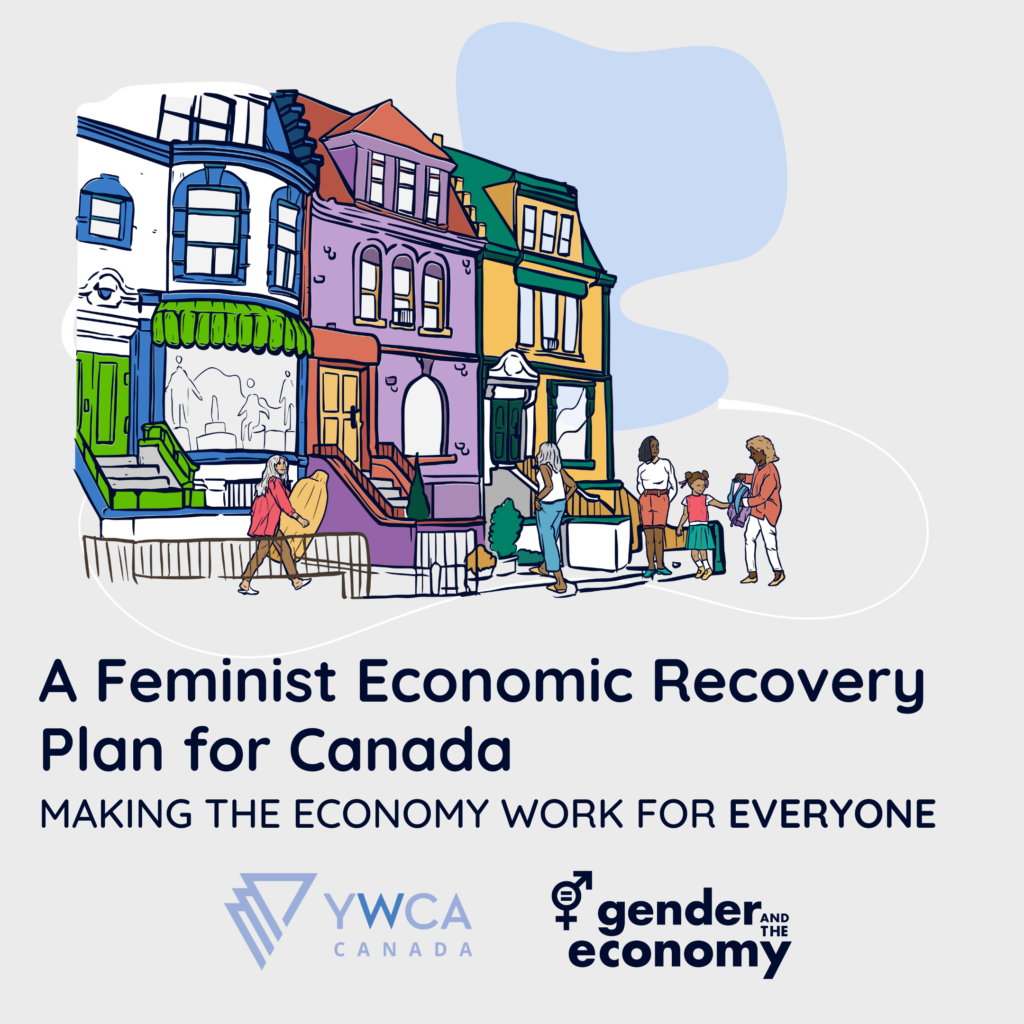Canada’s first Feminist Economic Recovery 8-Point Plan provides roadmap to address Depression-era economic lows – new report by GATE and YWCA Canada
Plan highlights how addressing systemic racism and increasing investments in child care, housing, and internet access can improve economic security for communities across Canada
July 28th, 2020
Toronto, ON – On every front, the COVID-19 pandemic has eroded hard-fought gains to gender equity. From massive layoffs to increased unpaid work to the rise of domestic violence, women have been disproportionately impacted by the health and economic crisis of COVID-19.
Released today, the ‘A Feminist Economic Recovery Plan for Canada: Making the Economy Work for Everyone’ report co-authored by the Institute for Gender and the Economy (GATE) at the University of Toronto’s Rotman School of Management and YWCA Canada offers an 8-point Plan to tackle systemic barriers and improve economic security for women, Two-Spirit and gender-diverse people.
“The economic, health and social impacts of COVID-19 have been devastating for the communities we work with. From the loss of steady jobs to child care shortages to addressing discrimination, hate and violence in all its forms, we are seeing we can’t go back to the old ways of doing things. We need a fresh approach that thinks about the economy and gender equity together. Our plan offers a roadmap and a starting point for action.” says Maya Roy, CEO of YWCA Canada.
The Plan calls for specific attention to address the unique needs and experiences of Black, Indigenous, racialized communities, people with disabilities, 2SLGTBQAA+ communities, migrant workers, low-income populations, newcomers and other communities facing systemic barriers, marginalization and oppression.
“Some might think that equity and diversity issues are luxuries that we can’t afford during a pandemic. Our analysis shows instead that considerations of gender, race, Indigeneity and other factors are essential for a robust recovery. This crisis has highlighted many underlying inequities in society, and building back better will lead to greater social and economic prosperity for Canada,” says Sarah Kaplan, Director of the Institute for Gender and the Economy.
The Plan proposes 8 major recommendations to build Canada’s economy back better so that it becomes more inclusive and ultimately more resilient for future crises.
The eight pillars of the Plan’s include:
1) Intersectionality: Understanding Power
2) Addressing Root Causes of Systemic Racism
3) Care Work is Essential Work
4) Investing in Good Jobs
5) Fighting the Shadow Pandemic
6) Bolstering Small Businesses
7) Strengthening Infrastructure for Recovery
8) Diverse Voices in Decisions
The Plan begins with a recognition that systemic racism against Black and Indigenous communities must be the top priority for post-pandemic recovery, including implementation of the Calls to Action of the Truth and Reconciliation Commission, Calls to Justice of the Missing and Murdered Indigenous Women and Girls Inquiry Report and the Parliamentary Black Caucus’ recommendations.
At the heart of the Plan is a focus on the care economy. Even before this crisis, access to affordable, accessible and high-quality child care was in short supply. The pandemic has shown that child care is an essential service. Without it, the rest of the economy can’t re-start and we risk losing a whole generation of parents, mainly women, from the workforce.
As the recently released Federal fiscal update notes, Canada’s GDP will shrink substantially with economic growth plummeting to Depression-era levels. To build back better, the Plan recommends that, starting immediately, Canada should invest at least 1% of its annual GDP in the early learning and child care sector. This will assure that the economy will recover more quickly by creating new jobs, investing in the next generation of workers and reducing the significant unpaid care burden women have taken on during this pandemic.
The Plan also recommends improvements in working conditions for precarious and migrant workers by calling for paid sick leave for all workers and Employment Insurance reform. The Plan also notes that immediate investments in critical infrastructure such as affordable housing, clean water and internet access will be essential for a stronger economic recovery for Canada.
To read the full plan and to sign up to learn more, visit: www.feministrecovery.ca
ABOUT THE INSTITUTE FOR GENDER AND THE ECONOMY (GATE)
The Institute for Gender and the Economy (GATE) at the University of Toronto’s Rotman School of Management promotes an understanding of gender inequalities and how they can be remedied—by people of all genders—in the world of business and, more broadly, in the economy. At GATE, we are changing the conversation on gender equality by: using rigorous research to investigate the hidden mechanisms that propagate gender equality; funding, translating, and disseminating innovative, academic research; and engaging executives, policy makers, and students to create new solutions for achieving equality, advancing careers, and creating economic prosperity.
ABOUT YWCA CANADA
YWCA Canada is a leading voice for women, girls, Two-Spirit and gender diverse people. For 150 years, we’ve been at the forefront of a movement: to fight gender-based violence, build affordable housing and advocate for workplace equity. We work to advance gender equity by responding to urgent needs in communities, through national advocacy and grassroots initiatives. Local YWCAs invest over $258 million annually to support over 330,000 individuals across the nation. Today, we engage young leaders, diverse communities, and corporate partners to achieve our vision of a safe and equitable Canada for all.
For media inquiries, please contact:
Anjum Sultana, Director of Public Policy & Strategic Communications, YWCA Canada
asultana@ywcacanada.ca | 647 205 3079
Ken McGuffin, Manager, Media Relations, Rotman School of Management, University of Toronto
